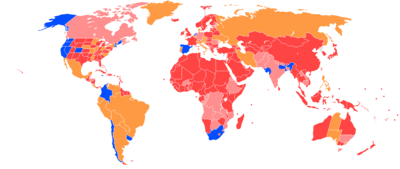Cannabis rights
| Part of a series on |
| Cannabis |
|---|
 |
|
Chemistry |
|
Economics |
|
Regional
|
|

Cannabis rights or marijuana rights are individual civil and human rights that vary by jurisdiction considerably.[1][2] The rights of people who consume cannabis include the right to be free from employment discrimination and housing discrimination.[3][4][5]
Anti-cannabis laws include civil infractions and fines, imprisonment, and even the death penalty.[6]
History
Until the twentieth century, anyone could grow and consume cannabis.[7] By the mid twentieth century, possession of marijuana was a crime in every U.S. state and most countries. In 1996, the passing of Proposition 215 by California voters restored limited rights for medical cannabis patients in the state. Other states and countries have since then joined California in guarding rights of cannabis consumers.[8]
In the United States, much is unclear about cannabis rights because despite state laws, cannabis remains illegal for all purposes, at the federal level, and consequently cannabis consumers do not belong to a protected class. Courts will address the issues surrounding housing and employment law, and disability discrimination.[3][4]
Use in common speech
- 2011 Wisconsin State Journal, "Marijuana rights activist Ben Masel said he's feeling pretty upbeat overall despite having untreatable lung cancer. "I'm definitely not in the, 'Oh, no, poor me, I've got cancer' mode," he said."
- 2016 Phoenix New Times, "Kathy Inman of Momforce, a local cannabis-rights organization, says many Arizona voters don't understand marijuana or why it should be legal. That made them easy pickings for the two groups that campaigned against Prop 205."
- 2017 NBC News, "The pro-cannabis rights group DCMJ used April 20th, or 4/20, to organize a free joint giveaway just steps from the Capitol in an effort to encourage Congress to reauthorize an expiring provision preventing the federal government from meddling in medicinal marijuana programs."
- 2017 NJ.com, "The marijuana rights activist argued those days should not be held against him, "in the interests of justice."
See also
Notes
- ↑ Membis, Liane (July 7, 2010). "Legalizing marijuana is civil rights issue, California NAACP says". CNN.
- ↑ Rafferty, Andrew (April 20, 2017). "Pot Advocates Worry Marijuana Protections Are Burning Down Under Trump". NBC News.
- 1 2 Liquori, Francesca (February 18, 2016). "The Effects of Marijuana Legalization on Employment Law". National Association of Attorneys General.
- 1 2 Nikolewski, Rob (November 24, 2016). "Can your landlord 'just say no' to marijuana now that Prop 64 passed?". The San Diego Union-Tribune.
- ↑ Edwards Staggs, Brooke (February 15, 2017). "Coalition aims to protect cannabis consumers from random drug tests at work". The Cannifornian.
- ↑ Meehan, Maureen (January 26, 2017). "Man Given Death Sentence for Selling Weed". High Times.
- ↑ Gatenio Gabel, Shirley (2016). "A Rights-Based Approach to Social Policy Analysis: Evil or Miracle Drug? Who Decides and How?". Springer Publishing.
- ↑ Clark Davis, Joshua (November 6, 2014). "The Long Marijuana-Rights Movement". The Huffington Post.
References
- Anders, Melissa (March 1, 2012). "Medical marijuana groups urge Michigan lawmakers to protect patient rights". MLive.
- Clark Davis, Joshua (January 6, 2015). "The Long Marijuana-Rights Movement". The Huffington Post.
- Edwards Staggs, Brooke (February 15, 2017). "Coalition aims to protect cannabis consumers from random drug tests at work". The Cannifornian.
- Liquori, Francesca (February 18, 2016). "The Effects of Marijuana Legalization on Employment Law". NAGTRI Journal, Volume 1, Number 2.
Further reading
- Gatenio Gabel, Shirley (2016). "A Rights-Based Approach to Social Policy Analysis: Evil or Miracle Drug? Who Decides and How?", pp. 60–61. Springer Publishing
- Caiuby Labate, Beatriz, and Cavnar, Clancy (2014), "Prohibition, Religious Freedom, and Human Rights: Regulating Traditional Drug Use", Springer Publishing